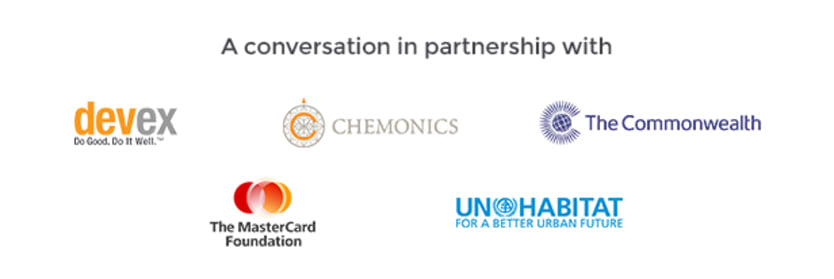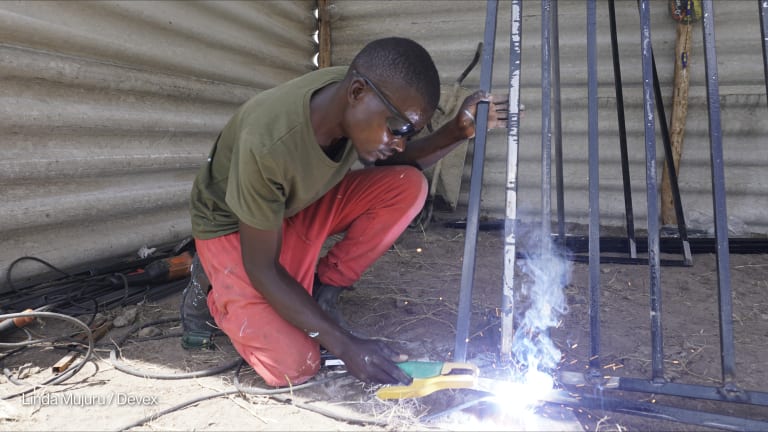
Standing before a poster of Albert Einstein with his quote on how the value of education is “not the learning of many facts but the training of the mind to think,” a young girl with glasses and a yellow Kids Genius apron proudly presents a small figure made of wood.
Kids Genius exposes children to industrial skills and empowers them to explore their creativity through science workshops that emphasize hands-on learning. Its founder, Sabine Kai, founded the nongovernmental organization in her home country of Lebanon, drawing on all that she’d learned about design thinking at TechWomen, an initiative sponsored by the U.S. Department of State that empowers women in science, technology, engineering and mathematics by pairing emerging leaders from Africa and the Middle East with professional counterparts in the United States.
The international community has long highlighted the importance of education in helping young people take their future into their own hands. But despite 164 governments committing to “Education for All” at the World Education Forum in Dakar, Senegal, 15 years ago, nearly 1 in 4 youths in the developing world remain disconnected from education, training and formal employment. And even when young people do have access to opportunities to embrace learning, the question becomes quality.
So what more can the international community do to ensure that education sets students up for success and prepares them to be full participants in the development of their countries?
At the head of the classroom lies the heart of the solution
At Gori School No. 12 in Gori, Georgia, third-graders hold up red or green cards to signal to their teacher whether they understand the lesson or need further instruction.
Programs meant to empower young people to embrace learning often center on the student. Those eager to improve education certainly should involve the very people they’re trying to help in project development. But in many areas of education, the problem and therefore the solution is at the head of the classroom.
See more stories from #YouthWill Embrace Learning:
● #YouthWill launches to recognize global development leaders
● How #YouthWill affect change: Voices from the Youth Assembly
● I want to make it, I want to go to high school
● How soccer saved me
● The world is connected, but some still wait for a plug
● MOOCs to the rescue?
● 5 apps to improve literacy
● Microsoft: Technology is a critical enabler for youth
That is why Nancy Parks, chief of party for a primary education project sponsored by the U.S. Agency for International Development, is implementing two strategies to empower students to learn: targeted checks for student understanding of a subject and support systems to empower teachers to implement new ideas in their classrooms.
Whether kids hold cards numbered one through nine to answer questions to simple math equations or give thumbs-up or thumbs-down to indicate whether they are ready to move on, simple check-ins can help teachers modify their approach.
“While these activities do not directly target students, students are the beneficiaries,” Parks explained. “If a student’s learning needs are addressed with targeted instruction, then the student is empowered to learn.”
USAID and Chemonics have developed what Parks called an e-Assess zone to help Georgian teachers generate classroom diagnostic assessments from a bank of test terms.
“Using the results from the assessments, teachers can determine the appropriate sequencing of lessons, identify which specific skills need targeted attention and track individual student progress to provide differentiated instruction as needed,” she said.
In many countries, the ministry of education provides teacher training — but those may occur as sporadically as once every five years, Parks suggested, noting Kyrgyzstan as one example.
The project in Georgia includes classroom observations of teacher practices.
“A cadre of 100 national trainers visits teachers after training sessions to observe implementation of the strategies they learned and to offer descriptive feedback on their performance,” Parks said, adding that principals accompany the national trainers on these visits to learn how they can assume the responsibility of teacher observations. “The combination of teacher learning circles and classroom observations ensure that the teachers are supported in introducing new strategies in their classrooms.”
As outlined by the Organization for Economic Cooperation and Development’s “Innovative Learning Environments” project, an important distinction in teacher training is the difference between assessment of learning and for learning.
“We are supporting the idea of continuous assessment for learning — as often as every 15 minutes during a lesson — to check student understanding of the concept being presented,” Parks said, emphasizing the importance of formative assessments rather than summative assessments, which are often end-of-year exams that serve as the be-all, end-all gauge to determine student performance. “Formative assessments check for understanding along the way and guide the teacher in making decisions about future instruction.”

Availability + relevance = accessibility
The Center for Strategic and International Studies and the International Youth Foundation partnered to develop the Global Youth Wellbeing Index to evaluate the connections between youth well-being and information and communications technology. Nick Martin, founder and CEO of TechChange, talked with Devex about the importance of ICT to help young people embrace learning, mentioning examples like tablets for literacy skills and cell phone cameras for community improvement projects.
While the aid community still devotes much of its attention to making improvements to formal learning — from working with teachers in the classroom to providing basic homework support — there should be an increasing emphasis on “what kinds of ICT solutions the global development community can utilize to make a difference in these communities,” Martin said. That’s why TechChange provides professional development courses on topics including mapping for international development and mobile phones for global health. In developing these courses, TechChange and companies like it have to consider the constraints their audience is under, which might include limited access to the Internet or inconsistent electricity.
Online courses like the free instructional website Khan Academy may provide education opportunities that complement — or perhaps even offer more than — traditional classroom learning. Of course, while so-called massive open online courses are all about access, their success in the developing world depends on the availability of electricity, which too often presents itself as a barrier. That is one reason why, without increasing accessibility through initiatives like the expansion of broadband, progress toward education for all can only go so far.
In much of the world, the barriers and boons for education have nothing to do with an Internet connection. In Bangladesh, for example, rivers swell in the rainy season, overflowing onto land and causing children to miss school days. That is, until Shidhulai Swanirvar Sangstha thought up the “floating school” solution, bringing schools to students through solar-powered boats that serve as libraries and adult education centers. As the international community tries to expand access to education, it should keep in mind that sometimes accessibility comes down to whether a student can make the journey from point A to point B.
Indeed, accessibility is a question of content as well as technology, stressed Meg Evans, international ambassador for Udemy, which offers real-world skills online.
“In order for students to engage with a particular online course, it must be in a topic that’s relevant for their daily life in their language and culture,” she said, explaining that this is what drove Udemy’s approach, which gives any expert the ability to create an online course. “Knowledge that was previously limited to those who could find an industry mentor or apprenticeship is now available to anyone.”
“The world no longer cares how much you know. The world cares about what you can do with what you know.”
— Tony Wagner, education innovatorBringing companies and classrooms together
Want to foster leadership, character and teamwork among boys and girls in the developing world? Think beyond the classroom and consider the basketball court as a place not just for play, but also for education. That’s what the National Basketball Association and USAID are doing with their “Live, Learn and Play” partnership, one of many examples of many foreign aid donors’ long tradition of using sports as a catalyst for international development.
Nonformal education, including sports, complements formal education in powerful ways by helping young people to develop life skills. And with the rise of learning opportunities outside of traditional classroom settings, on the court or behind the screen, it can be difficult for the formal education system to keep up.
“The world no longer cares how much you know,” Tony Wagner, an education innovator, often says. “The world cares about what you can do with what you know.”
With that in mind, the international community can play an important part helping young people to not just seize but also to create opportunities. One way to do so is by connecting the academic world and the business world.
That is part of why Daca Jovic, who served as the youth development specialist and component leader for sustainable local development project in Serbia implemented by Chemonics, developed partnerships between business associations and local universities. Her project created training courses that would allow students to work with companies on projects for academic credit. Acknowledging the challenges that young Serbians ready to enter the workforce faced, Jovic worked with the youth ministry to develop an online system for them to showcase their soft skills to prospective employers.
While the priority was to bridge the gap between academia and employment, the team made sure to involve young people in all phases of programming, from needs assessment to the creation of curriculum.
“The world is changing faster and faster. When we’re programming something, it’s hard to know whether it will be relevant in two years,” Jovic said of one of the key takeaways of her program work in Serbia.
That, she added, makes it all the more important to “listen to more young people about what they are really interested in.”
It’s often said that education empowers. But those eager to improve education would do well to also consider how empowerment can improve education.
Should students be consulted more in developing training courses? Share your thoughts by leaving a comment below?
Want to learn more? Check out the Youth Will website and tweet #YouthWill.
Youth Will is an online conversation hosted by Devex in partnership with Chemonics, The Commonwealth Secretariat, The MasterCard Foundation and UN-Habitat to explore the power that youth around the globe hold to change their own futures and those of their peers.








